analysis Asia
Malaysia's ASEAN chairmanship: Big on show, short on substance?
Prime Minister Anwar Ibrahim may have put ASEAN under global spotlight through his diplomatic engagements with US President Donald Trump in a recent summit, but questions remain over whether more tangible outcomes could be achieved during Malaysia’s chairmanship term.
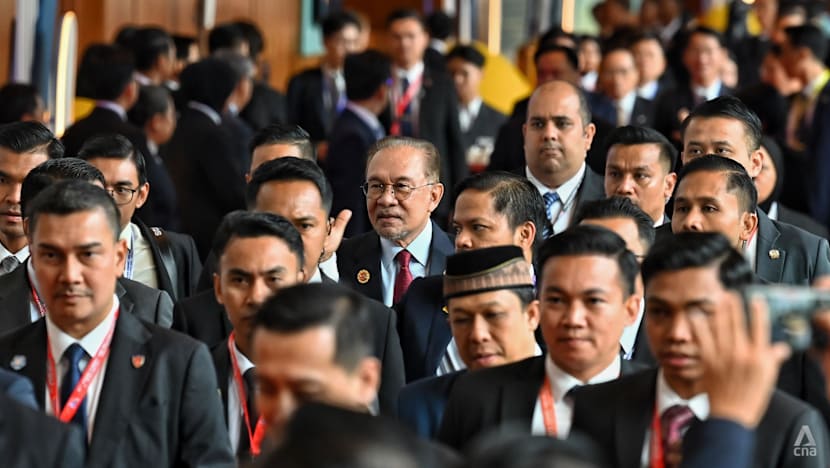
Malaysia Prime Minister Anwar Ibrahim (centre) at the 47th ASEAN Summit in Kuala Lumpur on Oct 27, 2025. (Photo: CNA/Zamzahuri Abas)

This audio is generated by an AI tool.
KUALA LUMPUR: Malaysia’s chairmanship of the Association of Southeast Asian Nations (ASEAN) this year has been the perfect stage for Prime Minister Anwar Ibrahim to showcase his diplomatic chops and persuasive charms, thereby giving a boost to his and the country’s standing on the world stage, say analysts.
But questions remain as to whether ASEAN - under Anwar’s leadership - could have achieved more tangible goals on trade as well as longstanding issues like the domestic conflict in Myanmar as well as overlapping claims over the South China Sea, with discussions for both seemingly making little headway.
Furthermore, while the recent ASEAN Summit and Related Meetings have served as a platform for discussions and negotiations, most of the noteworthy deals were not completed through the bloc’s mechanisms, but were rather done bilaterally.
Khoo Ying Hooi of Universiti Malaya's International and Strategic Studies Department told CNA that Malaysia’s chairmanship under Anwar was “symbolically strong but substantively mixed”.
“On one hand, we can’t deny Anwar has successfully restored a sense of visibility and moral voice to ASEAN by emphasising unity, dialogue, and multilateralism at a time of deep geopolitical divides.
“However, beyond diplomacy and eloquence, the tangible outcomes remain modest for now. While Anwar’s rhetoric on ‘cooperation over confrontation’ resonated, it did not translate into breakthroughs on pressing issues like Myanmar,” said Khoo, referring to the Southeast Asian country that has been in crisis since the military junta seized power in a coup in early 2021.
ANWAR’S CHARM OFFENSIVE A BOOST FOR ASEAN’S DIPLOMACY
Analysts told CNA that Anwar made good use of his prerogative as host during Malaysia’s chairmanship, culminating in Malaysia’s much-publicised welcome for US President Donald Trump as well as other world leaders in Kuala Lumpur for the recent ASEAN Summit that was held from Oct 26 to Oct 28.
At the end of the three-day summit, Anwar symbolically handed over the ASEAN chairmanship to Philippine President Ferdinand Marcos Jr.
The Philippines will officially take over in 2026, and will host two summits next year.
Experts said that Anwar’s move to bring out the red carpet for Trump was a calculated move that gave Malaysia global visibility.
Trump had previously made only a single appearance at the summit - the 2017 meeting in Manila - during his first presidency from 2017 to 2021.
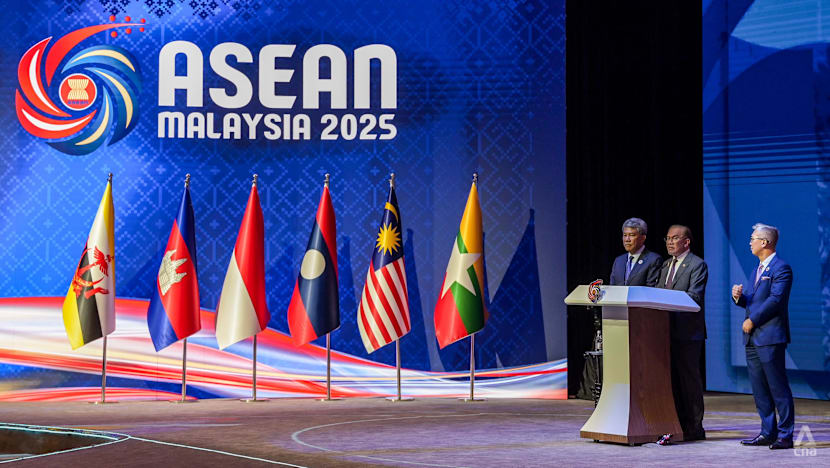
Political scientist Syaza Shukri of the International Islamic University Malaysia (IIUM) told CNA that Anwar did “well” in bringing the world to ASEAN and Malaysia this year.
“Not just China, but the attendance of BRICS leaders and other partners and Trump himself show there’s confidence in his leadership,” said Syaza, referring to the grouping of emerging economies that includes Brazil and South Africa.
Besides Chinese Premier Li Qiang, newly sworn-in Japanese Prime Minister Sanae Takaichi, Brazilian President Luiz Inácio Lula da Silva, South African President Cyril Ramaphosa, Australian Prime Minister Anthony Albanese and Canadian Prime Minister Mark Carney also attended the summit in Kuala Lumpur.
“The focus has been on managing the geopolitical rivalry and the impact of Trump’s tariffs … Given the circumstances this year, Anwar was able to manage them. It shows his expertise as a veteran politician and his own charisma,” said Syaza.
Trump had in April unveiled a raft of tariffs for the rest of the world dubbed the “Liberation Day” tariffs.
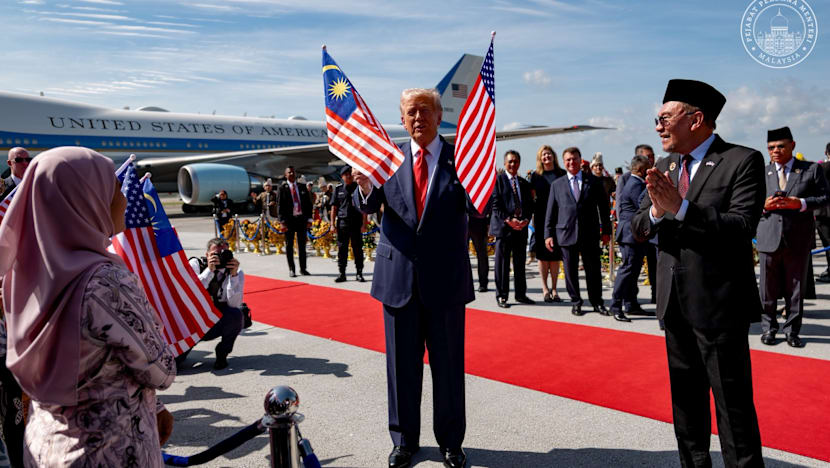
Separately, Syaza also gave the example of the joint declaration on peace and security between Cambodia and Thailand that was witnessed by Trump and Anwar as proof of the Malaysian prime minister’s credibility.
The two Southeast Asian neighbours had been locked in a border dispute, with tensions escalating in July into their deadliest military clashes in decades.
Trump had presided over the signing of the agreement by Thailand Prime Minister Anutin Charnvirakul and his Cambodian counterpart Hun Manet on Oct 26 on the sidelines of the ASEAN Summit, with the deal witnessed by Anwar.
During Sunday’s signing of the joint declaration, Trump paid tribute to Anwar’s role in resolving the dispute during tense border clashes in July.
“I called him right at the beginning, and said, you know, you have two countries that are fighting right next to you,” said Trump.
“We need a third place. We need a sort of neutral place, right! And he was there.”
While Trump had called the deal the “Kuala Lumpur Peace Accord”, Thailand’s Foreign Minister Sihasak Phuangketkeow avoided the term at a press conference after the signing, saying only that the declaration had put the two countries “on the pathway towards peace”.
Meanwhile, Khoo believed that Malaysia has projected itself as a credible facilitator amid the US-China rivalry and regional security tensions.
“What is clear now is that ASEAN has to some extent successfully extended its role to the Global South,” she said.
The Global South is a term used to describe countries in the developing world, primarily those situated in Latin America, Asia, Africa, and Oceania, characterised by their focus on economic growth and growing influence in global affairs.
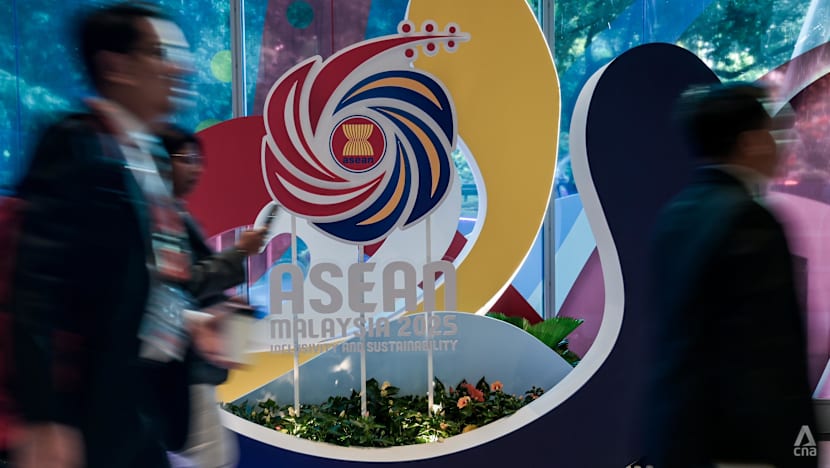
Anwar had repeatedly affirmed that ASEAN's engagement with all external partners demonstrated the bloc's centrality, as evidenced by some of the meetings and deals that took place at the summit.
Kuala Lumpur hosted a Regional Comprehensive Economic Partnership (RCEP) trade pact summit, the first time in five years the gathering has happened.
The RCEP - which includes all ASEAN members except newly admitted member Timor-Leste; as well as China, Japan, South Korea, Australia and New Zealand - is the world's largest trade bloc that came into force in 2022.
Following their summit, RCEP leaders issued a statement committing to ensuring that markets remain open, free and rules-based, among other things.
The ASEAN summit also saw China and the bloc sign an enhanced ASEAN-China Free Trade Area (ACFTA) deal, with the so-called 3.0 version covering areas such as the digital and green economies as well as supply chain connectivity, among others.
Joanne Lin, senior fellow and coordinator of the ASEAN Studies Centre at Singapore's ISEAS – Yusof Ishak Institute, said Anwar’s hosting style was equal parts personable and pragmatic.
This despite some demonstrations in some areas of Kuala Lumpur against Trump’s presence given the US’ perceived role in helping Israel in the Gaza conflict.
“Anwar tried to make space for all voices while keeping the agenda tight and the meetings efficient. That balancing act has helped reaffirm ASEAN’s credibility as a convener that can engage across divides.
“It also gave Anwar a personal diplomatic boost at home and abroad, projecting him as a steady statesman in turbulent times,” she told CNA.
Related:
Lin believes that Anwar’s approach to hosting Trump - such as the red carpet welcome - was a calculated move and not a naïve one.
Trump was welcomed by dancers and a band when he arrived at the Kuala Lumpur International Airport on Sunday morning. In a light moment, he danced to the tune of Hawaii-Five-O and was joined by Anwar. The leaders then rode together in Trump’s presidential limousine dubbed The Beast.
“Anwar understood the optics that Trump’s presence would draw global attention to ASEAN and by extension, to Malaysia’s chairmanship. The criticism at home was predictable, given Trump’s divisive image and the perception that Malaysia was pandering to US power,” said Lin.
“But Anwar’s rebuttal - that ASEAN engages ‘all quarters fairly’ - is accurate in spirit.”
Lin added that Anwar used his bilateral discussions with Trump to raise Malaysia’s concerns on Gaza and the humanitarian situation in the Middle East.
While praising Trump's role in the Gaza ceasefire, Anwar stressed that the peace deal must be broadened to genuinely incorporate Palestinian needs and interests.
The Gaza ceasefire agreement, a key part of Trump’s 20-point plan to end the Gaza war, went into effect on Oct 10. It remains fragile amid disputes over the pace of hostage and body exchanges and the delivery of humanitarian aid.
The conflict started when militant group Hamas attacked Israel on Oct 7, 2023, killing about 1,200 people and abducting around 250 hostages. Israel’s retaliatory campaign in Hamas-controlled Gaza has killed more than 67,000 people and displaced nearly the entire population, according to Palestinian health authorities.
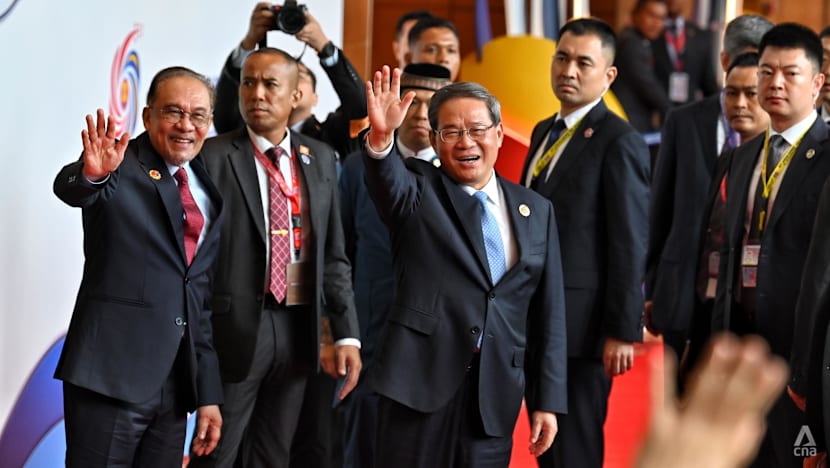
ASEAN A STAGE INSTEAD OF PLAYER IN DEAL-MAKING?
But questions were once again raised on ASEAN’s effectiveness, with some observers raising concerns about the bloc becoming a stage instead of a player in deal-making.
Analysts whom CNA spoke to said the meetings in Kuala Lumpur showed that while ASEAN remained a place where the world’s powers gather, not all of the action happens through the bloc itself.
Lin said that many of the most high-profile outcomes, such the US striking deals with Malaysia, Thailand, Cambodia and Vietnam, or trade talks between US Treasury Secretary Scott Bessent and Chinese Vice-Premier He Lifeng were negotiated on the sidelines rather than under ASEAN frameworks.
She also pointed out that the East Asia Summit (EAS) did not produce a joint statement, underscoring how major-power competition often overshadows ASEAN-led mechanisms.
The EAS is a forum on key political, security, and economic issues facing the Indo-Pacific region. It involves 19 participants, namely the 11 ASEAN member states, Australia, China, India, Japan, New Zealand, South Korea, Russia and the US.
“The challenge for ASEAN now is to bridge that gap between being a host and being a participant by operationalising its own frameworks so that future deals build on, rather than bypass, ASEAN mechanisms,” said Lin.
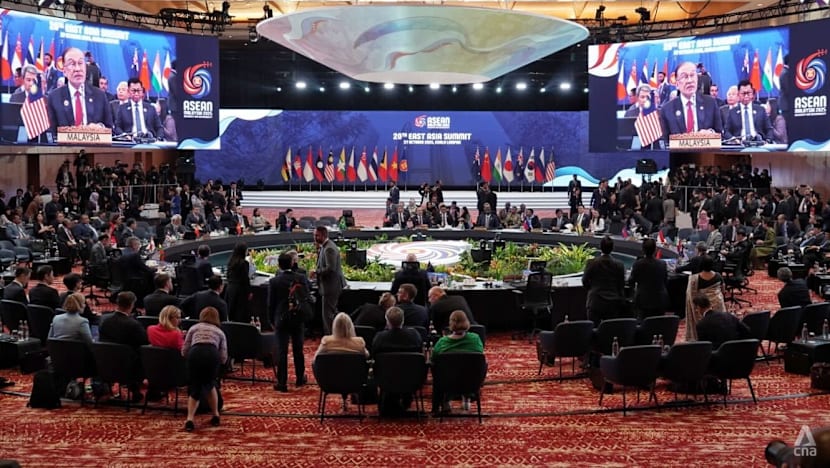
Other experts noted that some of the trade deals made were seemingly unfair to ASEAN members themselves.
Deborah Elms, head of trade policy at the Hinrich Foundation in Singapore, told CNA that the Cambodian and Malaysian agreements signed between Trump and the respective country leaders were “tilted much more” in favour of the US.
She said that while the US is not making any changes to its existing policies, Cambodia and Malaysia have to make fairly substantial adjustments to their domestic legislative, legal and regulatory frameworks under these agreements.
This includes following the US lead on export controls and critical minerals policies, Elms claimed.
“Malaysia held the ASEAN chair in a very challenging economic environment. I think it has done a good job in trying to stay focused on cooperation and integration.
“But that message may have been undermined by the signing of the agreement with the US. However, under the circumstances, it may have been the least bad option for Malaysia,” she said.
HOW IS ANWAR IMPACTED DOMESTICALLY?
While Anwar has scored on the diplomatic front internationally, analysts said that it is less clear if the same can be said about whether his ASEAN chairmanship has boosted his domestic political standing.
The experts noted a degree of negative sentiment regarding Trump's welcome, as the opposition sought to capitalise on this issue for political mileage.
Trump’s visit to Malaysia resulted in protests led by opposition party Parti Islam Se-Malaysia and civil society groups, which are against the US’ perceived support of Israel in the Gaza conflict.
Anwar’s handling of Trump’s visit was also criticised by opposition leader and former prime minister Muhyiddin Yassin, who called the welcome party for the US president “inappropriate” given the plight of the Palestinian people in Gaza.
Azmi Hassan, a senior fellow at the Nusantara Academy for Strategic Research, argued that while the large presence of foreign leaders may boost Anwar's international standing, the impact on his domestic popularity was marginally negative.
“There is a vast difference in terms of reception globally and domestically for Anwar but it is more or less status quo,” he said, noting that there has also been criticism of the trade deal signed with the US.
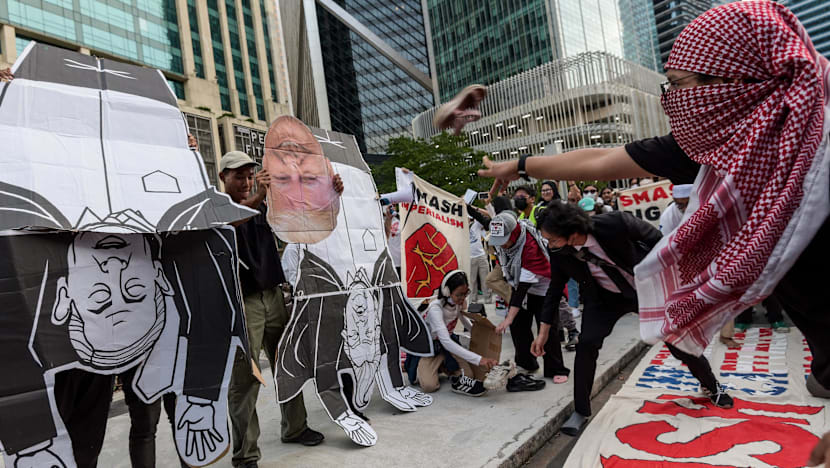
Syaza of IIUM said that while Anwar was able to win over some fence-sitters for his role in steering ASEAN over the past year, those who oppose him were able to play up some of the more controversial moves, especially surrounding Trump’s visit to Malaysia.
Even so, she concurred with Azmi’s assessment that the status quo would prevail.
“So domestically it’s mixed, with those who oppose Anwar claiming (that) any prime minister would be able to do what Anwar did, which I disagree with. But that is the sentiment.
“It’s hard to win over Malaysians over foreign policy and diplomacy because they are still concerned with the bread-and-butter issues,” said Syaza.
























